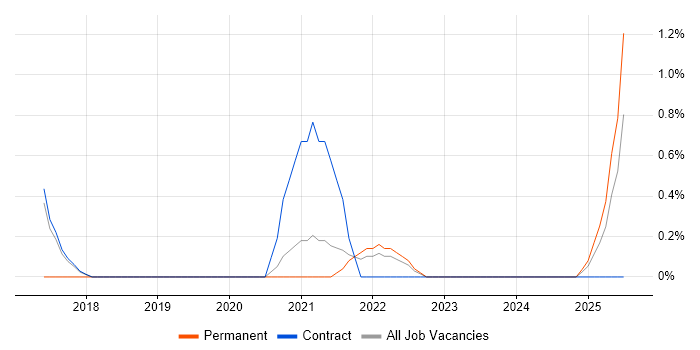Microsoft Azure Machine Learning (Azure ML)
Oxfordshire > Oxford
The table below provides summary statistics for permanent job vacancies advertised in Oxford requiring Azure Machine Learning skills. It includes a benchmarking guide to the annual salaries offered in vacancies that cited Azure Machine Learning over the 6 months leading up to 2 August 2025, comparing them to the same period in the previous two years.
|
|
6 months to
2 Aug 2025 |
Same period 2024 |
Same period 2023 |
| Rank |
31 |
- |
- |
| Rank change year-on-year |
- |
- |
- |
| Permanent jobs citing Azure Machine Learning |
1 |
0 |
0 |
| As % of all permanent jobs advertised in Oxford |
0.43% |
- |
- |
| As % of the Cloud Services category |
1.56% |
- |
- |
| Number of salaries quoted |
1 |
0 |
0 |
| 10th Percentile |
- |
- |
- |
| 25th Percentile |
£38,750 |
- |
- |
| Median annual salary (50th Percentile) |
£42,500 |
- |
- |
| 75th Percentile |
£46,250 |
- |
- |
| 90th Percentile |
- |
- |
- |
| Oxfordshire median annual salary |
£42,500 |
- |
- |
Azure Machine Learning falls under the Cloud Services category. For comparison with the information above, the following table provides summary statistics for all permanent job vacancies requiring cloud computing skills in Oxford.
| Permanent vacancies with a requirement for cloud computing skills |
64 |
119 |
125 |
| As % of all permanent jobs advertised in Oxford |
27.59% |
28.67% |
28.60% |
| Number of salaries quoted |
46 |
78 |
103 |
| 10th Percentile |
£36,000 |
£35,075 |
£30,850 |
| 25th Percentile |
£41,250 |
£41,250 |
£48,750 |
| Median annual salary (50th Percentile) |
£60,000 |
£54,500 |
£60,000 |
| Median % change year-on-year |
+10.09% |
-9.17% |
-4.00% |
| 75th Percentile |
£68,438 |
£64,750 |
£76,250 |
| 90th Percentile |
£90,000 |
£77,500 |
£82,500 |
| Oxfordshire median annual salary |
£45,000 |
£50,000 |
£57,500 |
| % change year-on-year |
-10.00% |
-13.04% |
- |

